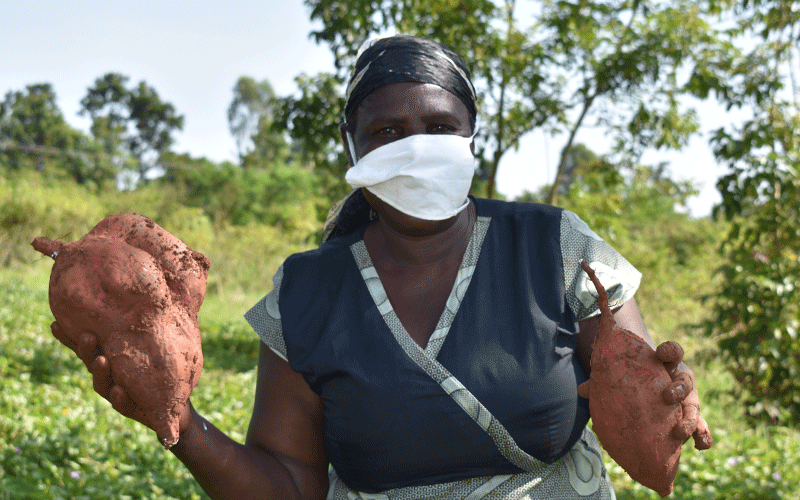Siaya farmers reap sweet returns from potato crop

A group of farmers in North Sakwa ward, Siaya county has taken a stab at sweet potato growing, an agribusiness venture, which is beginning to take off in the area.
The group christened Aila Moyie is leading efforts in cultivating the sugary crop for commercial purposes hoping to make it the area’s major cash crop in future.
Agribiz has established that some farmers in the area have ventured into the sweet potato farming as a business while others are still growing it for household consumption.
Florence Onditi, the caucus chairperson says the initiative is not only becoming a game changer to the members’ livelihoods, but also gradually turning to be an economic mainstay locally.
The group has since earned about Sh30,000 in profits from the crop’s sales in two harvest seasons.
First yield’s sale amounted to Sh10,000 while the second netted Sh20,000. The second harvest yielded ten 50kg sacks with each retailing at Sh2,000.
From the sales proceeds, the group plans to lease another farm in anticipation of increased productivity in the coming days.
Onditi says the group learnt about the secret of cultivating potatoes from Mwendo, a USAID-funded community based project championing grassroots development and livelihood improvement.
With the non-governmental organisation’s financial and technical support Aila Moyie landed the agricultural activity last year purposely to generate direct income.
Before going into the venture, the group members acquired technical, marketing and business skills through training offered by the German agency, GIZ through a farmers’ programme focusing on providing a training curriculum on sweet potatoes.
“We began with quarter acre plantation before expanding to half acre. Our ultimate plan is to enlarge the production further because we have seen the benefits,” says Onditi.
Initially, Aila Moyie grew sweet potatoes as a group before members took up the venture individually.
At an individual level, the group members have began replicating the agricultural activity and are planting the crop in their various farms.
Every group member drawn from 29 households, now has at least quarter acre farm under sweet potato.
For continued access to seedlings and sustainable output, some farmers produce and supply vines used in the production chain.
Approximately three acres of farmland is set aside for vine multiplication.
Food security
Benta Onyango, the group lead farmer says the farming venture is already changing the fortunes of members since they fully embraced it as potential agribusiness.
Additionally, Benta points out that sweet potatoes farming is a source of food security and economic empowerment to the farmers and the entire community.
She says members are finding the business viable because of the access to ready market.
“We have ready market because there is high demand for the crop locally. Potential consumers and traders majorly come to buy at the farm’s gate,” says Benta.
The farmers specifically grow varieties such as Namnyerera, Ken-spot and Kabonde, which take between three to five months to mature for harvesting.
“Our plan is to upscale the production to meet the rising local demands,” adds Onyango.
Onditi’s half-acre sweet potato farm raked Sh6,000 in the recent harvest. The farmer has since extended the production to another half acre and anticipates fetching increased income as a result.
“Local farmers should embrace sweet potato growing so that they can tap into the economic benefits,” she urges, adding that the venture is a sure way to ensure food sufficiency thus alleviate poverty.
The sweet potatoes farming initiative has been cascaded down to four more groups with about 160 households currently owning farms under the crop.
Other upcoming ones are Nyabenge, Stars of the Lake, Okola Sunshine and Maseno farmers groups.
Diversification
Jackson Achuti, agricultural extension officer in charge of North Sakwa ward says the initiative will bolster food security in the area.
Achuti says farmers started by growing yellow flesh variety, which was initially introduced in the area and later diversified to other varieties.
He says the uptake of the crop growing is on the upward trend as farmers continue to embrace the venture.
“There is high multiplier effect from the activities being done by the groups. Therefore, the production uptake is on the rise because other farmers are able to see and demonstrate what they see practically,” says Achuti.
The agricultural officer states that a lot of sensitisation is being done through local administrators on the economic importance of sweet potato to ensure increased productivity.
At the demo farm the farmers are trained on agronomic practices right from planting up to harvesting where they go back to replicate what they learn. They are also given vines to plant in the farms.















